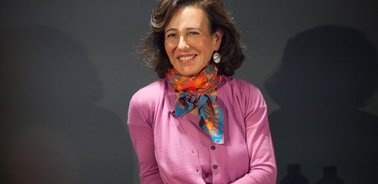- Home
- Blue Talks
- Data Is More Than The New Oil — It’s Oxygen
Data is more than the new oil — it’s oxygen

Ana Botín explains how data sharing beyond the financial sector could unlock value and innovation.
Today, no one can deny the power of data. Not only does it fuel powerful business models, but the way it’s used impacts the daily lives of billions of people. Yet despite its ubiquity, Ana Botín, Executive Chair at Banco Santander, argues in a series of thought-provoking LinkedIn posts that the meaning of data is not fully understood.
She begins by talking about one of the first people to grasp data’s immense economic potential — the British mathematician Clive Humbly. In 2006, he proclaimed that data is the new oil. Like black gold, it was a lucrative business opportunity.
But in 2020, the technologist Tim O’Reilly said the oil metaphor didn’t quite fit. That’s because when you take oil from the ground, it has intrinsic value. Data, on the other hand, requires the building of huge digital platforms to be really useful. Instead, to O'Reilly, data is more like sand. Silicon is a form of sand and one of the most abundant elements on earth, but it is only truly valuable after going through advanced industrial processes, research and development to create silicon chips.
Even so, O’Reilly realized his metaphor didn’t capture data’s whole story. Aware of the many negative side effects of digital technology like misinformation, lack of competition and addiction, O'Reilly also compared it to something else – Oxycontin, the highly addictive pharmaceutical opioid. Yet, Botín argues that comparisons to oil, sand and even drugs fail to encapsulate data’s far-reaching effects.
Data is the new competition, argues Botín, drawing on her experience with Open Banking. On one hand, data can lead to anti-competitive behavior. That’s because companies with the best data gain significant advantages. Those advantages snowball into more data and the self-reinforcing dynamic continues. As a result, companies become monopolistic while innovation and customer choice decline. On the flip side, however, sharing data can do just the opposite.
So she believes the best metaphor is that data is the new oxygen. If highly concentrated, data, like oxygen, can be harmful. Yet when data is shared across society, it can benefit everyone — unleashing innovation, competition and improving people’s lives.